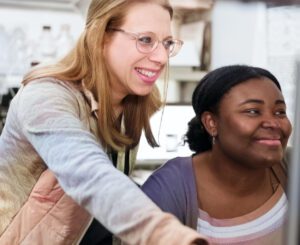Muhlenberg has received a $266,280 grant from the Arthur Vining Davis (AVD) Foundations to support the creation and implementation of the MUHLES (Mentorship of Underrepresented students for High impact LEarning in STEM) Program. The MUHLES Program is designed to improve the retention of underrepresented students in STEM majors at Muhlenberg. The MUHLES Program is set to launch in the summer.
“The AVD Letter of Intent (LOI) application process is highly competitive,” says Provost Laura Furge. “Recognizing the opportunity to create more support networks for traditionally underrepresented students in STEM with a launch grant from AVD, Muhlenberg STEM faculty came together to innovate and create a proposal that caught the attention of the AVD Foundations — a testimony to our faculty’s compelling, innovative plan and commitment to student success.”

Professor of Chemistry Keri Colabroy works on summer research with Bernice Owusu ’25, an Emerging Leader and biochemistry major, who helped pilot the MUHLES program.
Institutional data show that the first year is when such students are most likely to “leak” out of the STEM pipeline, says Professor of Chemistry Keri Colabroy, the proposal’s primary author. Underrepresented students are more likely to fail intro-level science and math courses, and that takes a large number of majors off the table for those students. Research experiences in STEM are transformative, Colabroy says, but those typically come later in a student’s college career.
The MUHLES Program provides a path for underrepresented students in STEM in the pre-matriculation summer and the first year of college. Each student in a cohort will receive a stipend and housing to participate in the summer research program and will be connected with a faculty mentor and peer mentor in the same lab as well as an alum from an underrepresented group who works in STEM. The research experience is designed to do two things. First, it will familiarize incoming students with the process of doing science. Second, it will help them build relationships, inside the lab and outside it, with their mentors and with other students in their cohort, to foster a sense of belonging and a network they can turn to as they navigate college-level STEM coursework.
“The literature tells us that students from underrepresented backgrounds do not feel like they belong in the sciences,” says Colabroy, who developed the program alongside Chief Diversity Officer and Associate Provost for Equity & Inclusion Brooke Vick, Dean of Academic Life Gretchen Gotthard, Assistant Professor of Biology Giancarlo Cuadra and Assistant Professor of Physics Charles Collett. “Being part of a community where we have conversations and we eat pizza and we go mini-golfing … you build community around things other than the science so that when the science happens, you’re doing it in the context of a community that you’ve already established.”
The grant, which will cover 40 students over the course of three years, will first fund the work that’s required to get this program up and running — the training of the mentors, for example, and the development of applications for students and assessment tools for the program. The goal is to launch the program this year.
For more information see here.
